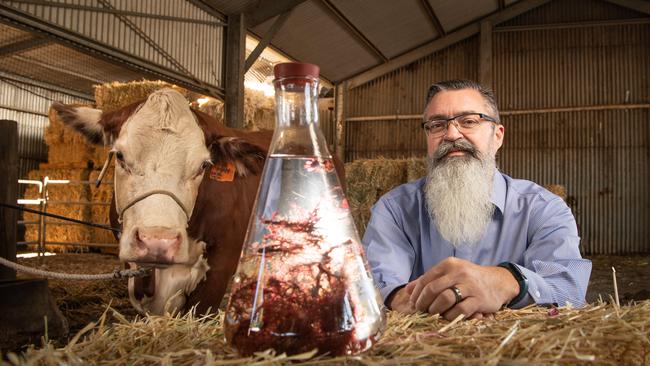Silicon Valley firm pours almost $18m into Adelaide-based bid to solve the cattle methane problem
A seaweed-based product designed to reduce greenhouse emissions is set to hit the market soon after an investment of almost $18m from a Silicon Valley investment firm.

Business
Don't miss out on the headlines from Business. Followed categories will be added to My News.
CH4 Global will build a seaweed research and production facility at West Beach and launch a cattle feed product designed to reduce methane emissions next year after an investment of almost $18m.
The world’s 1.5 billion or so cows generate more than 150 million tonnes of methane per year, according to CH4 Global which is led by Adelaide ex-pat Dr Steve Meller.
This presents an “urgent” problem, Dr Meller says, with methane about 86 times worse than carbon dioxide in terms of its impact on global warming.
CH4 Global has been working on a seaweed-based feed product which the company says, when fed to cows, can reduce methane emissions by up to 90 per cent while also improving feed conversion.
CH4 Global has been growing the relevant seaweed strain – asparagopsis armata – at sites including Port Lincoln, Kangaroo Island and Yorke Peninsula, and raised $4.1m from investors about this time last year to fund that part of the process.
The company will announce on Thursday it has raised another $US13m, about $17.9m, with the new money to be used to build a new facility at West Breach and launch the product onto the global market.
Longer-term a second, larger processing facility will be built at an as-yet unnamed site on the Eyre Peninsula.
Silicon Valley-based venture capital firm DCVC has led the Series A investment round, with Dr Meller saying there was strong interest from other investors with a climate change focus.
“What we’ve developed at CH4 Global is the hatchery, aquaculture, processing and formulation capability for asparagopsis to reduce the methane output of those 1.5 billion cows,” he said.
“We are formulating our unique feed supplement products to meet the specific needs of each cattle market segment including for feedlot operations, dairies, as well as for remote and generally unattended cattle around the world.
“Our initial focus is Australia and New Zealand, the native home of asparagopsis, as we plan to have our first product ready for market in 2022 from our market demonstration facility in Adelaide.’’
The company said it would also focus on supply chain optimisation to develop reliable, repeatable manufacturing capabilities to scale up production in 2023 and beyond.
“This work is fuelled by the company’s sense of urgency that we must act quickly if we are to be able to avoid a climate tipping point,’’ the company said.
Farming the seaweed also helps to reverse the growing levels of excess CO2 in the oceans, Dr Meller said, and reduces ocean acidification.
Dr Meller co-founded the company in 2019 and it now has offices in the US, New Zealand and Australia.
As part of the deal, DCVC partner Zachary Bogue will join the company’s board as will Dr John Hamer from DCVC Bio.
“The team at CH4 Global is building an extraordinary company and its mission is critically important to dramatically reduce methane from ruminants now and through the coming decade,’’ Dr Hamer said.
“The company’s strong sense of urgency aligns with recent reports that action in the next 10 years is critical for the climate crisis.”
Dr Meller completed a PhD in neuroscience at the University of Adelaide in the 1980s.
Originally published as Silicon Valley firm pours almost $18m into Adelaide-based bid to solve the cattle methane problem



